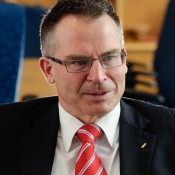THE ACT Legislative Assembly has passed amendments to the electoral funding laws to, among other things, remove the cap on donations and to provide for a fourfold increase in public funding from $2 per vote received to $8 per vote.
The changes will mean that, at the election next year, the ALP and the Liberal Party can expect to receive in the order of $700,000 each from ACT ratepayers.

The primary justification for maintaining ownership of the clubs is, of course, the party’s need for funds to support its operations and election needs. With public funding of almost three quarters of a million dollars now effectively assured, that argument looks a bit thin.
There are, of course, a range of subsidiary arguments that are regularly advanced within the party for maintaining ownership and control of the clubs. Some of these have undoubted merit, but many are spurious and fail to recognise the very real moral and ethical issues, let alone the political implications, implicit in a political party which is in government, being the owner of a major gambling empire and one of the largest operators of poker machines in the Territory.
There is no doubt that the Labor clubs have over the decades provided enormous support to not just the Labor Party but to the broader Canberra community, in which it has disbursed millions of dollars in community contributions and sponsorship.
The clubs are also a major employer and have always sought to represent best practice in staff management and the management of licenced premises. The clubs are a very significant community resource. For this the Labor Club, the Labor Party and its members deserve recognition and can be justly proud.
At the heart of concerns about the ALP maintaining ownership of the clubs is the important and, at times, complex notion of conflict of interest and the importance of ensuring, particularly in respect of an industry as problematic as gambling, that all regulatory and administrative arrangements are transparent and that there is not and cannot be any suggestion of a conflict of interest, perceived or otherwise.
There is in addition, of course, for a progressive and socially responsible left-leaning political party, such as the ACT branch of the ALP, which prides itself on being an exemplar, the moral and ethical responsibility it bears for the crushing devastation that problem gambling wreaks on some people and their families.
However, it seems that there is currently no appetite among either the current Labor teams in either the Legislative Assembly or the federal parliament, in the party office and, perhaps most pertinently, from within the party factions to sell the Labor clubs or to break the party’s relationship with gambling or poker machines.
This has not always been the case. In 2008 the Labor Club board, with the full support of the party, began a process for the sale of the clubs. This resulted, by June 2009, in four detailed bids, all well in excess of $20 million, to a select tender process involving three of the major club groups in the ACT and a national union.
The board was in the process of finalising negotiations with the preferred tenderer, an existing ACT-based club group, when the ALP National Executive, faced apparently with an internal factional spat over the proposed sale, intervened in the administration of the ACT branch and took over responsibility for its management. Following national intervention the proposed sale was abandoned.
It is a pity that the National Executive has never thought fit to explain, particularly to ACT branch members, why it felt so strongly about the need for the ALP to remain a major player in the gambling industry. It would, I think, be an oversimplification to think it was just about the money.
Regardless of the motivation of the National Executive in its unjustified and spoiling intervention in the affairs of the ACT branch, the passage by the Legislative Assembly of the recent changes involving a massive increase in public funding for political parties is surely the signal that it is time to distance the party from this ticking time bomb.
Jon Stanhope was Chief Minister from 2001 to 2011 and represented Ginninderra for the Labor Party from 1998. He is the only Chief Minister to have governed with a majority in the Assembly.
Who can be trusted?
In a world of spin and confusion, there’s never been a more important time to support independent journalism in Canberra.
If you trust our work online and want to enforce the power of independent voices, I invite you to make a small contribution.
Every dollar of support is invested back into our journalism to help keep citynews.com.au strong and free.
Thank you,
Ian Meikle, editor




Leave a Reply